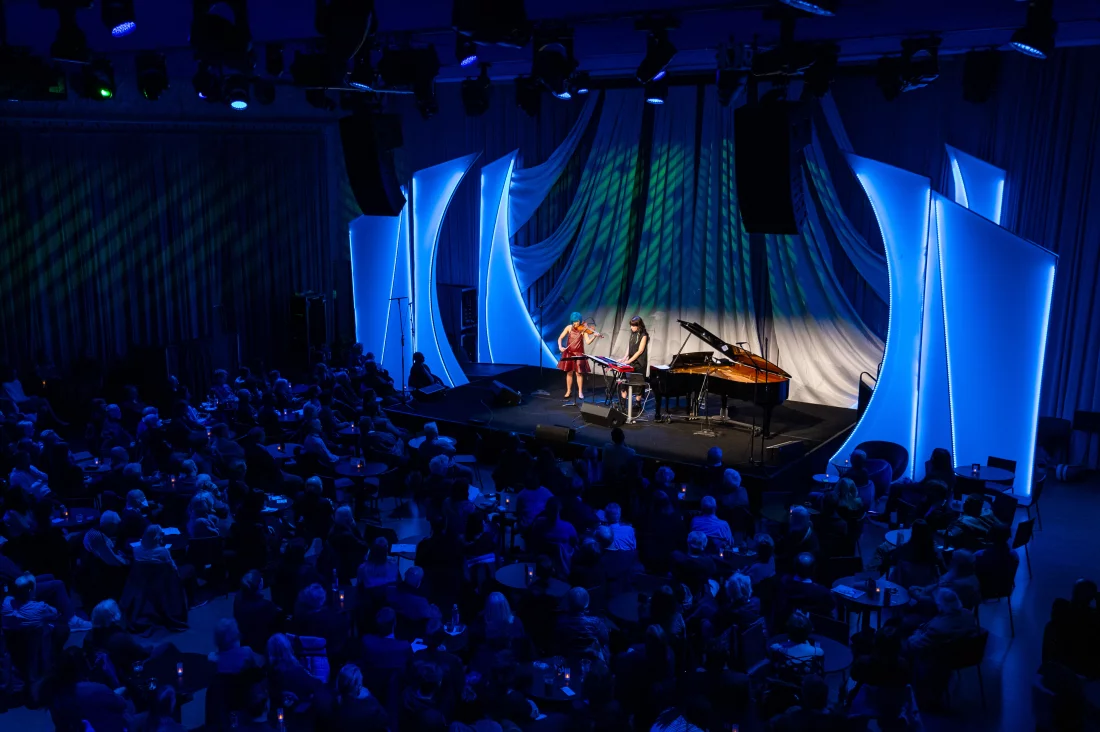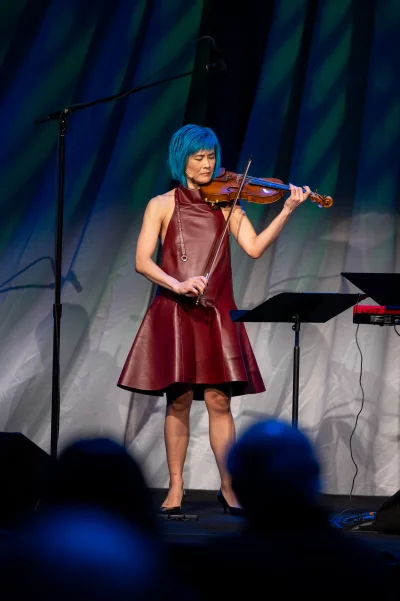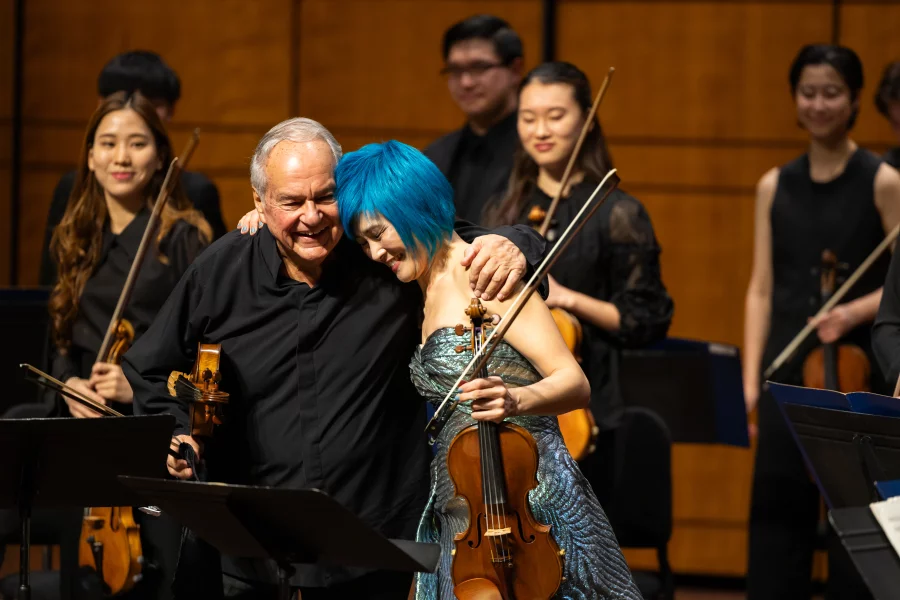NPR Morning Edition
By Olivia Hampton
October 15, 2024
original link
Jennifer Koh seeks innovation and 'artistic risk' in revamping chamber music series
 Jennifer Koh, left, is revamping the venerable chamber music program at the Kennedy Center in Washington, D.C. with innovative programming and community engagement.
Jennifer Koh, left, is revamping the venerable chamber music program at the Kennedy Center in Washington, D.C. with innovative programming and community engagement.Derek Baker/The John F. Kennedy Center for the Performing Arts
For anyone who thinks classical music is a buttoned up, stuffy old art form, Jennifer Koh says, have another listen.
"I hope everyone comes," Koh says about her first full season of programming for the Fortas Chamber Music Concerts series at the John F. Kennedy Center for the Performing Arts in Washington, D.C.

Jennifer Koh, who champions living composers and people marginalized in an often-exclusive classical music industry, says "it's really a tragedy and our loss if we don't hear from people unlike us."
Derek Baker/The John F. Kennedy Center for the Performing Arts
Koh, a violinist, took over as artistic director after the death of her predecessor and collaborator, pianist Joseph Kalichstein, who had served in the role for a quarter century. Fortas, a staple of the classical music scene in the nation's capital, was heavy on tradition. Koh is blowing the dust off and leaning heavily into the experimental, the young and the new.
A one-day new music festival in November, Sounds of Us, will feature more than 40 newly commissioned works by composers including Vijay Iyer, David Ludwig, Carlos Simon and Nina C. Young performed by high school and college students enrolled at The Juilliard School and the National Symphony Orchestra Youth Fellowship program. Some students will see their own compositions premiered.
Spread across four stages, the concerts mark musical visions of America's future ahead of its 250th anniversary in 2026. They highlight steps in a musician's journey: To Begin (their pursuit), To Believe (in their dream), To Become (what they envision) and To Be (a working musician). The centerpiece is a new piece by Angélica Negrón that incorporates everyday sounds recorded and shared by people all over the country.
"It's really a tragedy and our loss if we don't hear from people unlike us," Koh told NPR. "I already know what's in my head, so what I really want to learn about is what's in other people's heads... to hear the voices of people who have had totally different experiences from our own. And to be able to advocate and highlight their work is really important to me."
The season blends old and new, from the music itself to the very musicians on stage. Later in the season, South Korean piano sensation Yunchan Lim — the youngest person to ever win gold at the Van Cliburn International Piano Competition, in 2022 at age 18 — performs Bach's Goldberg Variations and Portuguese master Maria João Pires makes a rare visit to D.C. Koh herself will perform Bach's complete sonatas and partitas for solo violin.
There's a similarly broad range when it comes to ensembles, from the high energy, boundary-pushing Third Coast Percussion and the Balourdet Quartet — formed in 2018 and recipients of this year's prestigious Avery Fisher Career Grant — to established groups like the Miró Quartet and the Takács Quartet.
Some individual concerts blend old and new. The Balourdet Quartet will give the D.C. premiere of a work by University of Chicago PhD student Paul Novak, sandwiched between some Mozart and Beethoven.
Koh's 15-year collaboration with composer Missy Mazzoli perhaps best illustrates her vision for the future of classical music. Mazzoli, who’s gone from playing in punk bands to composing for the Metropolitan Opera, describes herself as an "omnivorous" musician.

Jennifer Koh, right, featured her distinguished mentor Jaime Laredo, left, last season at the Kennedy Center in Washington, D.C. for a concert featuring double concerti for two violins, an extension of her "Two X Four" project highlighting connections between teacher and student.
Zach Mahone/John F. Kennedy Center for the Performing Arts
"For me, all sound is a potential part of the palette, and I don't think in terms of genre when I'm writing, I don't think, Oh, I'm going to make this a classical quartet, but with a twist," Mazzoli said ahead of a concert with Koh in March at the Kennedy Center's alternative lounge-like space, the Club at Studio K. "Every new work is a risk. It's thrilling. Something is coming into being that will tell us something different about this world that we live in.”
People gathered around dimly lit round tables before a stage glowing in shades of blue and red. Koh stepped on stage matching those hues with her bright blue hair and sleeveless red Napa leather dress as the tin of conversations faded into applause.
Mazzoli joined Koh on piano and electronics for a set that included an arrangement of her violin concerto called Procession. She composed it during pandemic shutdowns in what was once the Swedish island home of Ingmar Bergman, the reclusive film director.
The concerto was inspired by ancient healing rituals around another deadly pandemic — the bubonic plague. The so-called Black Death wiped out nearly a third of Europe’s population in the 14th century.
In its full orchestra form, which Koh premiered with the National Symphony Orchestra in 2022, the concerto ends after a hammer blow to tubular bells and the solo violin bow’s abrupt stop on the strings.
In another work called All I Want Is All of It, Mazzoli sampled parts of pieces she has dreamt up and Koh performed over the years.
"There is a necessity to take artistic risk," Koh said. "Because classical music, I wouldn't call it like the largest moneymaking thing in the world. So when you take that risk, can you guarantee that every piece is going to be like, I don't know, the Grosse Fugue of Beethoven? No. But you create an environment and a space and funding so that you can have that.”
Copyright ©2024 NPR
© Jennifer Koh, All Rights Reserved. Photography by Juergen Frank. Site by ycArt design studio